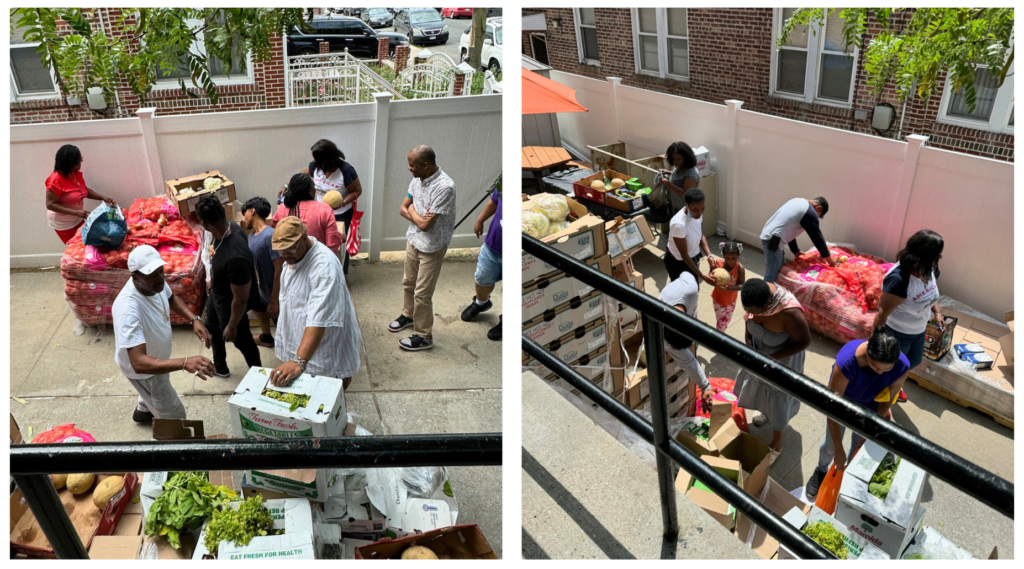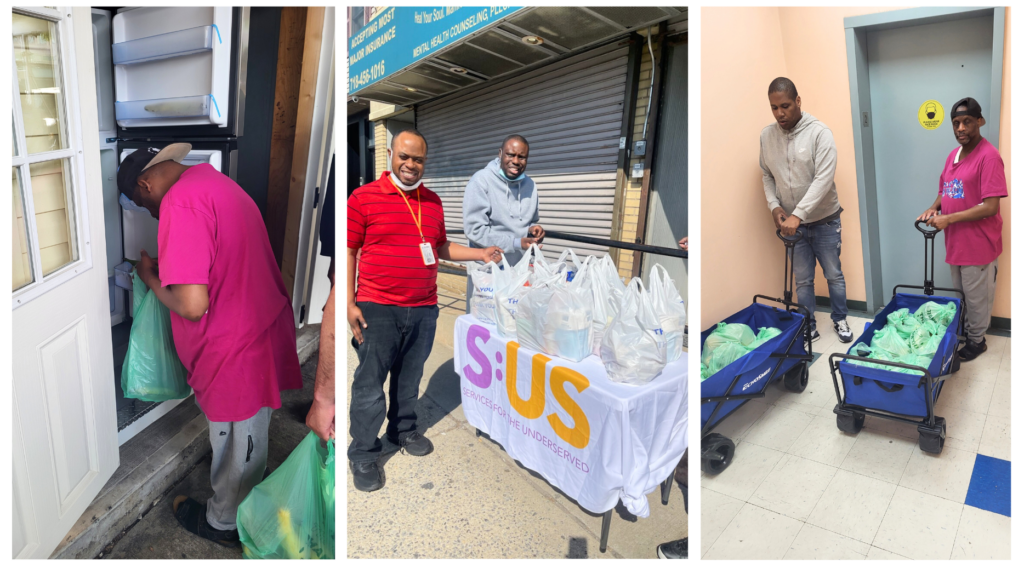A Collaborative Approach: Addressing Food Insecurity & Empowering Adults with Disabilities
By Lori Lerner, LMSW, RYT-200 hr., S:US Coordinator of Family and Wellness
Autism Spectrum News
Fall 2024
New York City is experiencing unprecedented levels of food insecurity, with hunger impacting over 1.2 million New Yorkers in 2022.1 Visits to New York City food pantries and soup kitchens were up 75% in 2022 compared to pre-pandemic levels.2 Inflation costs soared along with the COVID-19 pandemic, labor shortages, and global supply chain issues. In the 2022 Annual Survey of the people we serve at Services for the UnderServed (S:US), 43% of respondents reported that they need help accessing a food bank, meal delivery, or grocery delivery. This large percentage was at the forefront of our minds at S:US as a large nonprofit organization based in New York City supporting people with disabilities, people living in poverty, and people facing homelessness. We employ a dedicated staff of 1,800, many of whom face the same challenges or support loved ones with these hardships.
With a passion to help alleviate food insecurity and by embodying S:US’ commitment to advancing social justice and health equity to underserved neighborhoods, S:US’ leadership staff in Developmental Disabilities Services and Community Food Security – Jajaida Gonzalez, Johanna Cepin, and Michael Hollis – launched the Community Fridge program in 2022. Today, there are five community fridges located outside S:US supportive housing and group homes for people with intellectual/developmental disabilities (I/DD) in Brooklyn and the Bronx. These boroughs were chosen because it is where people are experiencing the highest food insecurity rates in New York City (19.7% in the Bronx and 15.5% in Brooklyn).1 As S:US President and CEO Perry Perlmutter shared at the recent opening of our fifth fridge, “We are committed to supporting the Bronx community by ensuring that everyone has access to fresh, nutritious food. This fridge is more than just a place to pick up groceries, it’s a symbol of our ongoing dedication to fostering health, dignity, and hope for all.”3
Last year, S:US Chief Program Officer Monica Santos and S:US Vice President of Day Habilitation Services Jajaida Gonzalez, presented “Mutual Aid: Community Fridges Fostering Community Via Direct Giving” at the New York Alliance for Inclusion and Innovation’s Annual Conference. Their presentation highlighted the importance of addressing complex issues like food security in our communities. The Community Fridge program is operated by adults with I/DD and/or Autism (ASD) who attend S:US’ Day Habilitation programs. As stewards and with support from staff, they clean and maintain the fridges on a weekly basis. Not only are they gaining transferable work skills, but they are also experiencing joy in helping to serve their communities.
Darinka Vlahek, Adult Day Services Director at AHRC NYC, and her colleagues attended the mutual aid presentation. They were impressed with the fridge program and had a desire to collaborate to help cultivate food security in the Bronx and support the people in their programs to build skills. The seeds of collaboration were planted to grow the support provided to community fridges. “This collaboration transcends more than the food provision; it showcases that people with disabilities can make meaningful contributions and are integral members of their communities,” says Darinka.
In May, AHRC NYC’s day program participants and staff attended training sessions with S:US’ leadership team to learn about the protocols utilized to clean the refrigerators and pantry including recommended supplies, various canned and non-perishable food for re-stock, frequency of food delivery, how to organize pantry food, and how to interact with an eager public waiting to access food. Jajaida Gonzalez welcomed the collaboration which would help to expand the program. She shares, “Our community fridges aim to foster a sense of community, impart skills, and address food security challenges in our neighborhoods. Partnering with participants and staff from AHRC NYC underscores the significance of our collective efforts in addressing complex issues like food security in our city. This is a collaborative endeavor emphasizing the mutual benefits of skill development for all people with I/DD and ASD and not limited to the people that S:US supports.”

Day hab participants from S:US and AHRC NYC unbox and prepare fresh produce for the community fridge.
Volunteers and staff from AHRC NYC began volunteering on a weekly basis by maintaining the cleanliness of the refrigerator and pantry, stocking food items, and ensuring its freshness. Initially, staff from AHRC NYC provided guidance for the stewards to support them in their endeavor. But the volunteers have become seasoned in their roles and staff now wait in the background in case assistance is needed. Yolanda Benjamin, Community Support Supervisor at AHRC NYC’s Day Program, appreciates the partnership and remarked, “[This collaboration] opens new avenues for people we support and staff. John Hardnett Jr., a program director from a home managed by S:US near the fridge came to help our group which was so kind. Our stewards and staff are eager to help in the community.”
Brittney, a steward, likes to volunteer. She shares, “My favorite part is to clean the fridge with paper towels and cleaning wipes so that when people come to get food, there is a clean space. The staff helped guide and train me to build my skills to volunteer which I really appreciate.” Deniece Dwyer, Community Support Professional at AHRC NYC’s Day Program, also really enjoys working with the fridge program. “The participants are very eager to volunteer, they love it and they’re very hands on. They look forward to it all week long and we know that we are doing good work. It can be a bit overwhelming when so many people are eager to retrieve the food when we are still stocking the pantry, but we help put smiles on people’s faces. Everyone is eager to help and pitch in,” Deniece explains. The neighborhood’s eagerness to access food staples from S:US community fridges emphasize the abundant need of these resources to support food security in our communities. Sophia, another steward from AHRC NYC and volunteers weekly, shares, “I like to clean the fridge and help out in the community with the other volunteers. It feels good to help other people.” Both Brittney and Sophia, along with their peers and staff, appreciate having a positive impact in their community and being able to witness the benefit of their efforts firsthand.

Adults with I/DD and ASD served by S:US and AHRC NYC stocking the community fridge with fresh food and pantry items.
The S:US community fridges not only offer nourishment to people living in the Bronx and Brooklyn, but it also provides a sense of connection and purpose for people with I/DD and ASD. As the New York Times columnist David French wrote recently in his article The Loneliness Epidemic Has a Cure, “With fellowship comes joy. With connection comes opportunity. There are few higher and better callings than to forge a bond with a person and provide a place where they belong.”4
The people we serve with I/DD and ASD are developing a deeper sense of meaning, purpose, and connection by maintaining the community fridges. We look forward to cultivating our partnership with AHRC NYC so more New Yorkers can access free food.
References
1. Gundersen, C., Strayer, M., Dewey, A., Hake, M., & Engelhard, E. (2022). Map the Meal Gap 2022: An Analysis of County and Congressional District Food Insecurity and County Food Cost in the United States in 2020. Feeding America.
2. City Harvest data from cityharvest.org/hunger-in-nyc.
3. “S:US Celebrates Opening of Newest Community Fridge in the Bronx,” S:US press release, August 16, 2024.
4. “The Loneliness Epidemic Has a Cure” by David French, The New York Times, September 2, 2024.
